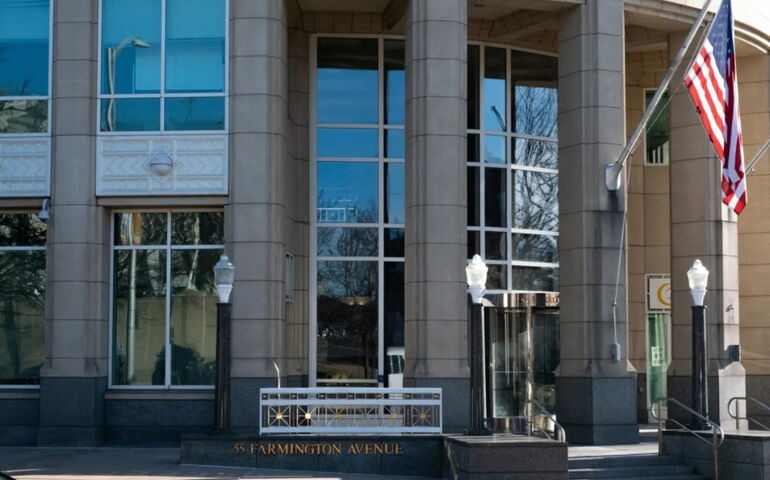Processing Your Payment
Please do not leave this page until complete. This can take a few moments.
-
News
-
Editions
-
- Lists
-
Viewpoints
-
HBJ Events
-
Event Info
- 2024 Economic Outlook Webinar Presented by: NBT Bank
- Best Places to Work in Connecticut 2024
- Top 25 Women In Business Awards 2024
- Connecticut's Family Business Awards 2024
- What's Your Story? A Small Business Giveaway 2024 Presented By: Torrington Savings Bank
- 40 Under Forty Awards 2024
- C-Suite and Lifetime Achievement Awards 2024
- Connecticut's Health Care Heroes Awards 2024
-
-
Business Calendar
-
Custom Content
- News
-
Editions
View Digital Editions
Biweekly Issues
- April 29, 2024
- April 15, 2024
- April 1, 2024
- March 18, 2024
- March 4, 2024
- February 19, 2024
- February 5, 2024
- January 22, 2024
- January 8, 2024
- + More
Special Editions
- Lists
- Viewpoints
-
HBJ Events
Event Info
- View all Events
- 2024 Economic Outlook Webinar Presented by: NBT Bank
- Best Places to Work in Connecticut 2024
- Top 25 Women In Business Awards 2024
- Connecticut's Family Business Awards 2024
- What's Your Story? A Small Business Giveaway 2024 Presented By: Torrington Savings Bank
- 40 Under Forty Awards 2024
- C-Suite and Lifetime Achievement Awards 2024
- Connecticut's Health Care Heroes Awards 2024
Award Honorees
- Business Calendar
- Custom Content
CT canceled only one audit of self-reported Medicaid overpayments
 SHAHRZAD RASEKH / CT MIRROR
55 Farmington Ave. in Hartford, home of Department of Social Services offices where Kosta Diamantis and former legislator Chris Ziogas personally delivered a check from Ziogas' fiancée for Medicaid overpayments.
SHAHRZAD RASEKH / CT MIRROR
55 Farmington Ave. in Hartford, home of Department of Social Services offices where Kosta Diamantis and former legislator Chris Ziogas personally delivered a check from Ziogas' fiancée for Medicaid overpayments.
When Helen Zervas was notified in January 2020 that her optometry practice was going to be audited by Connecticut officials, the Bristol eye doctor responded by hiring an attorney and voluntarily repaying nearly $600,000 to the state.
In doing so, Zervas, the owner of Family Eye Care, joined a list of more than 45 doctors, pharmacies and other medical providers that willingly returned money to Connecticut in recent years after notifying the state that they had overcharged the Medicaid insurance program.
But documents obtained by The Connecticut Mirror show Zervas, who is the fiancée of former state Democratic lawmaker Christopher Ziogas, received a benefit that none of those other medical providers had.
In return for Zervas writing the $599,810 check, the Connecticut Department of Social Services — the state’s Medicaid agency — agreed to cancel the scheduled audit of her practice.
Such audits can often take months or years to complete and, in some instances, can open medical providers up to potential criminal charges, if officials determine someone intentionally defrauded the Medicaid program.
The deal Zervas and her attorney struck with DSS allowed her to admit that her practice charged the state’s Medicaid program for services that were never performed, while avoiding the prospect of state auditors combing through her records and potentially clawing back even more money for the state.
DSS has the capacity to audit only a small percentage of the tens of thousands of Medicaid providers in the state every year, according to legislative reports.
But when the agency does open an audit, it sends the provider a one-month notice that it intends to sample a portion of their billing records for discrepancies, which are then used to calculate how much money needs to be returned to the state.
Records provided by DSS through a request under the state’s Freedom of Information Act confirm the agency never finished its audit of Family Eye Care even though Zervas, after being notified that an audit was scheduled, admitted to overbilling the state’s Medicaid program by more than half a million dollars between 2017 and 2019.
The state’s handling of that unfinished audit has since become entangled in a grand jury investigation after federal law enforcement officials subpoenaed a number of records related to Zervas and the payment she made to DSS.
As part of that criminal investigation, federal prosecutors demanded records related to who was entering and exiting the DSS headquarters in Hartford in early 2020. They requested text messages from the same time period that Zervas and her attorney were negotiating the deal with DSS.
Prosecutors also obtained several months’ worth of emails from state officials, including messages from Ziogas, who was still serving in the Connecticut General Assembly in early 2020.
The records gathered by the grand jury show the check Zervas wrote to DSS was personally delivered to the agency’s office in Hartford by a high-ranking government official: Konstantinos Diamantis, who was serving at that time as the state’s deputy budget director.
Diamantis, who stepped down from his government posts in late 2021 after he became the subject of another grand jury subpoena, told the CT Mirror that he attended church with Zervas in Bristol. And he said that he and Ziogas, who are distantly related, hand-delivered the check to the DSS office in order to prevent the payment from getting delayed in the mail during the early months of the pandemic.
Zervas did not respond to emails for this story or several phones calls to her optometry office.
Diamantis told the CT Mirror that he did not know why the audit of Family Eye Care was never finished. “I do not know the DSS process,” he said. “Those are DSS questions.”
DSS declined to answer several questions for this story, including who made the final decision to cancel the scheduled audit of Zervas’ practice.
“As this particular matter appears to remain under review as part of a broader federal investigation as previously reported, the department is unable to comment further at this point in time,” Christine Stuart, a spokeswoman for DSS, wrote in an email.
DSS said other providers have hand-delivered checks to DSS on occasion, but Stuart said the agency does not keep specific records of how each Medicaid repayment is received.
Stuart said some other DSS audits have been closed before completion but did not offer any examples.
Zervas’ interactions with DSS, however, stand out when compared to other doctors and medical providers that, after being notified that an audit was coming, acknowledged overbilling the Medicaid program.
Records show that those providers, including a pair of smaller medical practices and a major Connecticut hospital, followed many of the same steps that Zervas did when they learned they were facing audits of their own.
They went through their accounting and medical records after being notified of the impending review by the state. They identified overpayments from the Medicaid program, which serves more than 900,000 low-income and disabled individuals in Connecticut. And they returned that money to DSS.
Yet none of those providers, according to state records, had their pending audits canceled by DSS. And all of the providers who were audited were eventually forced to return even more money to the Medicaid program, on top of what they had already willingly repaid.
One of those medical providers told the CT Mirror that Zervas received preferential treatment that they were never offered by the state.
Wendy Haggerty, a therapist who opened a practice in Madison in 2014, was informed that she would be audited by state officials the same month that Zervas received her notice in the mail.
But for Haggerty, the outcome of the state audit would end in ruin for her business.
Haggerty said she immediately responded to the notice from DSS’s audit division by consulting with an attorney and proactively reviewing her records for charges that didn’t comply with the state’s Medicaid policies.
After that review, Haggerty said, she disclosed nearly $30,000 in charges that were not in compliance with the state’s Medicaid rules. Her attorney then sent an official letter to John McCormick, the director of DSS’s audit division, acknowledging the overpayment — just as Zervas and her lawyer had.
In response, Haggerty said, she received instructions from the state informing her to mail a check directly to McCormick at his office in Hartford.
State officials, however, continued to conduct a wider audit of her practice, which took another 22 months to complete and resulted in the state ordering her to pay an additional $42,964.
Haggerty ultimately closed her practice in Connecticut following the lengthy audit.
“I understand that there are people who have friends in high places that can get them breaks from the government. That’s just the way it works,” Haggerty said. “But DSS put me out of business after I came forward and explained the error and paid them back immediately.”
Since then, Haggerty moved to Florida and opened a new practice in Sarasota. She said learning that DSS canceled another provider’s audit after they self-reported overpayments made her angry all over again.
“Keep in mind these audits are not done by anyone in the mental health field who understands how we work,” Haggerty said. “We helped so many clients over the years, and we absolutely deserved to get paid for our work. This audit was a money grab and, in my case, it hit a single mom trying to do her best to work in an already significantly underpaid profession.”

2022 Giving Guide
This special edition informs and connects businesses with nonprofit organizations that are aligned with what they care about. Each nonprofit profile provides a crisp snapshot of the organization’s mission, goals, area of service, giving and volunteer opportunities and board leadership.
Learn more
Subscribe
Hartford Business Journal provides the top coverage of news, trends, data, politics and personalities of the area’s business community. Get the news and information you need from the award-winning writers at HBJ. Don’t miss out - subscribe today.
Subscribe
2024 Book of Lists
Delivering Vital Marketplace Content and Context to Senior Decision Makers Throughout Greater Hartford and the State ... All Year Long!
Read Here-
2022 Giving Guide
This special edition informs and connects businesses with nonprofit organizations that are aligned with what they care about. Each nonprofit profile provides a crisp snapshot of the organization’s mission, goals, area of service, giving and volunteer opportunities and board leadership.
-
Subscribe
Hartford Business Journal provides the top coverage of news, trends, data, politics and personalities of the area’s business community. Get the news and information you need from the award-winning writers at HBJ. Don’t miss out - subscribe today.
-
2024 Book of Lists
Delivering Vital Marketplace Content and Context to Senior Decision Makers Throughout Greater Hartford and the State ... All Year Long!
ABOUT
ADVERTISE
NEW ENGLAND BUSINESS MEDIA SITES
No articles left
Get access now
In order to use this feature, we need some information from you. You can also login or register for a free account.
By clicking submit you are agreeing to our cookie usage and Privacy Policy
Already have an account? Login
Already have an account? Login
Want to create an account? Register
Get access now
In order to use this feature, we need some information from you. You can also login or register for a free account.
By clicking submit you are agreeing to our cookie usage and Privacy Policy
Already have an account? Login
Already have an account? Login
Want to create an account? Register






0 Comments